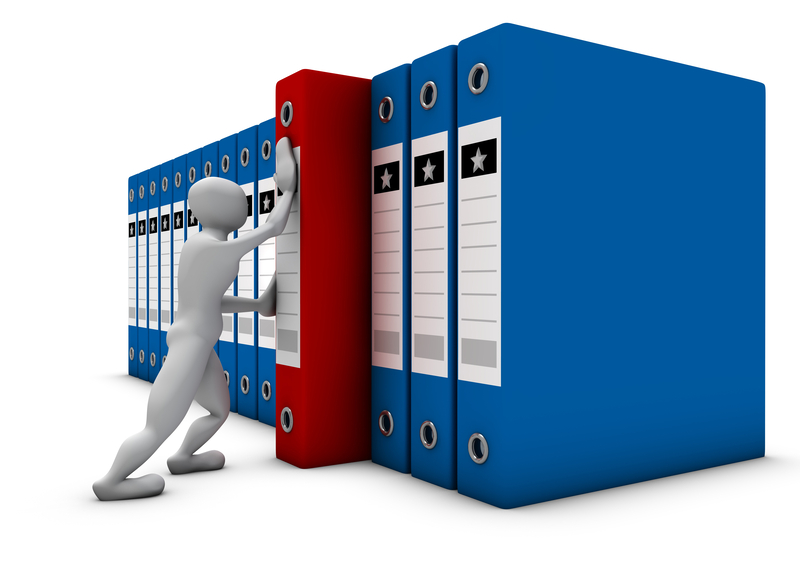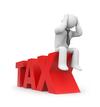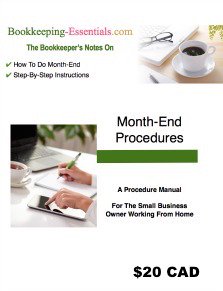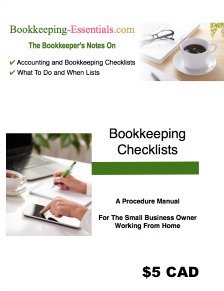
The Bookkeeper's Notes on CCPC
Canadian Controlled Private Corporations
Part 1 of a 3 Part Series
What You'll Find In This Chat
- CCPC and Business Corporations Act
- How to Prepare a Basic Corporate Tax Return (T2) Yourself but it is not recommended
- Tax Compliance Notes for Corporations (opens to a different page)
- Tax Rates and Limits for Corporations (includes active income, small business deduction including new in 2019 passive investment income rules and taxable capital employed)
- Director's Liabilty for Taxes (opens to a different page)
- When to Incorporate - The Advantages and Disadvantages of Being a CCPC ... includes references for "kiddie tax"
- Personal Service Corporations / Personal Service Businesses - the rules have changed, are you up-to-date?
- Corporate WCB Owner Obligations and Services
- Sell or Redeem Shares
- Inactive Corporations
- Questions & Answers
I'm going to be upfront here. I do not have a lot of experience with CCPC (Canadian controlled private corporations) as I specialize in sole proprietorships ...
... so this page is just The Bookkeeper's Notes on CCPC.
... where I track things as I learn them ... so I can have easy reference back to them later.
Canadian controlled private corporations have unique tax planning opportunities in Canada, especially for the owner managed corporations.
I have found there is a wealth of free information on self-employment and/or sole proprietor bookkeeping and taxes ... but not so much on how to keep corporate books or how to prepare your corporate tax return. I'm guessing it is because it is a more complex subject ...and a mistake ... such as not making an election when needed, or utilizing owner manager remuneration strategies incorrectly, or not planning in advance how you are going to use your capital losses before they expire ...could cost you a lot of money ... and it is very hard and expensive for an accountant to get you out of hot water once you're in it ... and some things can't be fixed, so what's done is done. You pay for your mistakes ... an expensive lesson on learning the CCPC rules.
So PLEASE, PLEASE, PLEASE check with your accountant before you implement any topics I mention here ... because they really are just The Bookkeeper's Notes on CCPC.
INDEX for My Notes on CCPCs
Is Incorporation Right For You And Your Business? |
Part 1
|
Part 2
|
Part 3
|
I will continually add topics and information about CCPC - Canadian Controlled Private Corporations as I come across them ... and I know I'm repeating myself but ...
Please use the information on this page more for talking points with your accountant ... so you have a better feel for what kind of information you are seeking.
What is a CCPC?
To be a Canadian Controlled Private Corporation (CCPC) you must meet the following criteria:
- The corporation must be a resident of Canada; incorporated in Canada or a resident on June 18, 1971
- It must not be controlled by one or more non-residents, one or more public companies or a combination of non-residents and public company.
When Should You Incorporate as a CCPC in Canada?
You operate a business as a sole proprietor or a partnership. Is it the right time to incorporate your business as a CCPC?
Keep reading to find the answer ...
CCPC and Business Corporations Act
Corporations in BC are regulated by the Business Corporations Act (BCA). Prior to March 29, 2004, BC corporations were regulated by the Company Act.
A good article by duhaime.org titled British Columbia Company Law: Business Corporation Act explains the incorporation process, share issuance, shareholder rights, entitlement of dividends, and the Board of Directors composition requirements, responsibilities and liabilities.
In B.C., audits can only be performed by a licensed CA or CGA under Part 7 Section 205 of the Business Corporations Act. All CCPC should be familiar with this Act.
An Overview of the BC Business Corporations Act, written on March 1, 2004 and in user friendly language, can be found at FMC-Law.com> Publications> Keyword = business corporations act, Area of Expertise = competition, Type = publication.
While reading the overview, I found it interesting to note that "the BCA limits a director’s liability where there is reliance in good faith on officers or professional advisors." (italics mine)
Here is a table of Corporation Acts for the rest of Canada
| Province | Act | Acronym |
|---|---|---|
| Canada | Canada Business Corporations Act | CBCA |
| Newfoundland | Newfoundland and Labrador Corporations Act | NLCA |
| New Brunswick | New Brunswick Business Corporations Act |
NBBCA |
| Nova Scotia | Nova Scotia Business Companies Act | NS Companies Act |
| Quebec | In 2011 Business Corporations Act (Quebec) Prior to 2011 Companies Act (Quebec) |
QBCA |
| Ontario | Ontario Business Corporations Act | OBCA |
| Manitoba | Corporations Act (Manitoba) | MCA |
| Saskatchewan | Business Corporations Act (Saskatchewan) | SBCA |
| Alberta | Alberta Business Corporations Act | ABCA |
Resource: Doing Deals in Canada: A Practical Guide January 2010 at lavery.ca
How to Prepare a Corporate (CCPC) Tax Return (T2) Yourself
While I don't recommend you actually do your own corporate tax return (T2), I found an article accompanied with a video on how to prepare a CCPC T2 return yourself by Madan, CA; a chartered accountant in Ontario. As I've been asked this question many times, I thought I'd share the link.
I really need to emphasize that I don't advise you do this though because the instructions are for a very basic company and omit common schedules you may be required to fill out. Also, you could end up paying yourself a dividend that is not approved in your minutes, or forgetting to report your passive income, or .... basically creating a whole bunch of trouble for yourself.
Go to madanca.com> blog> tax tips> How To Prepare Corporation Income TaxReturn For Business In Canada. It's tricky to find so you might have to cut and paste the article title into his search box to actually find the article.
You will need to have your year-end complete before you prepare the return as you need your adjusted balance sheet and income statement. The first step in preparing a corporate tax return is to input or import your financial statements in GIFI (General Index of Financial Information) code to Schedules 100 and 125.
Madan explains where to get your corporate tax forms on the CRA website (type "T2 returns and schedule" in CRA's search box) along with what forms you need (for his example); Schedules 100, 125, 50, 8, 1 and 200.
Here is an overview of the steps:
- Enter your balance sheet into Schedule 100 (GIFI (General Index of Financial Information) format).
- Enter your income statement into Schedule 125 (GIFI format).
- Enter your shareholder information into Schedule 50.
- Complete Schedule 8 ... enter all your capital asset purchases and disposals here by capital cost allowance class. If you follow my link, towards the end of the chat I explain how to determine how much CCA to claim in a year.
- Complete
Schedule 1 which calculates your net income (loss) for tax purposes.
This schedule starts with your net (income) loss for accounting purposes
from your GIFI statements then adds back accounting items that are
treated differently for tax purposes and deducts the allowable taxable
deductions.
- Complete Schedule 200 (the 8 page T2 jacket) ... remember to answer "no" to IFRS. In Madan's example, the company qualifies for the small business deduction.
Tax Payable Part I
- calculate tax payable at the general corporate tax rate of 38% per ITA subsection 123(1)
- deduct federal abatement 10% per ITA subsection 124(1)
- deduct small business deduction 17% per ITA section 125(1) ( applicable if ABI under $500,000 limit)
- deduct M&P deduction 13% per ITA section 125.1 (applicable if M&P income over SBD limit)
- deduct the general rate reduction 13% per ITA subsection 123.4(2)(applicable if ABI over $500,000 limit)
- adding additional refundable tax 6.7% per ITA section 123.3 (applicable on investment income)
Once the steps above have been completed, the tax program will:
- determine your taxable income by deducting items such as dividends received, charitable donations and/or deductible losses.
- calculate your Allowable Business Income (ABI) (see Schedule 7),
- determine your tax payable - Part I (see side bar)
- determine your tax payable of investment income by calculating Aggregate Investment Income (AII), refundable taxes, refundable dividend tax on hand
- determine your tax payable - Part IV
Please be aware that Madan's example is for a very basic CCPC return and very likely will NOT be suitable for your needs.
For
example, the article (haven't watched his video yet) seems to have
ignored calculating active business income on Schedule 7, so please make
sure you at least have your first return prepared professionally. Schedule 7 requires you input your passive / investment income to determine your ABI.
If you then decide to do it yourself the following year, make sure you have the prior year tax return beside you and that you have not missed any schedules required for your business situation.
Before you attempt to do your T2 preparation yourself, ask yourself if you are really going to save money long term by not hiring a tax accountant. You don't know what you don't know.
CCPC Tax Rate and Limits - Small Business Deduction
CCPC are taxed favorably (interpret that as lower or at a reduced rate) on Active Business Income (ABI) up to the small business threshold or limit which was:
- $500,000 federally for 2009 to 2022
- $400,000 federally for 2007 to 2008
- $300,000 federally for 2005 to 2006
- $250,000 federally for 2004
- $225,000 federally for 2003
- $200,000 federally for 2002
This favorable rate reduction is called the Small Business Deduction (SBD).
Amounts eligible for reduced tax rate instead of the general 15% tax rate:
2019 to 2022 - 9% SBD tax rate; general tax rate 15%; investment income 38.7%
2018 - 10% SBD tax rate; general tax rate 15%; investment income 38.7%
2016 & 2017 - 10.5% SBD tax rate; general tax rate 15%; investment income 38.7%
2014 to 2015 - 11% SBD tax rate; general tax rate 15%; investment income 34.7%
2012 to 2013 - 11% SBD tax rate; general tax rate 15%
2011 - 11% SBD tax rate; general tax rate 16.5%
2010 - 11% SBD tax rate; general tax rate 18%
2009 - 11% SBD tax rate; general tax rate 19%
2008 - 11% SBD tax rate; general tax rate 19.5%
How the general tax rate is calculated:
General corporate tax rate 38%
- federal abatement 10%
- small business deduction 13%
= CCPC tax rate 15%*
*Personal Service Corporations do not qualify for this rate. There is an additional tax on investment income. Provincial corporate tax is an additional tax. Effective January 1, 2019 new passive investment income also affects the small business deduction.

Schedule 7 calculates ABI which excludes:
- Passive income such as investment income which includes taxable capital gains net of allowable capital losses, property income net of property losses, and foreign business income. Incidental property income is deemed ABI; that is interest from temporary cash balances or temporary rentals of excess space. **NEW** The concept of a substantive CCPC was introduced in the 2022 federal budget to restrict a CCPC from artificially losing its CCPC status by manipulating a corporation's status to defer tax on passive investment income.
- Specified Investment Business (SBI) whose main purpose is to earn income from property such as interest, rent, royalties or dividends income. There is an exception if you have five full-time employees working on this.
- Personal Service Business (PSB) income from an incorporated employees is discussed later on this page. There is an exception if the PSB has more than five full time employees.

***NEW*** Passive Investment Income Rules
Effective January 1, 2019, new passive investment income rules come into effect that may clawback your Small Business Deduction. CCPCs can earn between $50,000 and $150,00 in passive income before the business limit phases out. Previously the phase out was only based on taxable capital employed in Canada. The CRA website explains the reduction in the CCPC business limit will be the greater of its taxable capital business limit reduction and its passive income business limit reduction for the year.
CCPCs do not qualify for the small business rate reduction if the taxable capital employed in Canada is $15 million or more.
Taxable capital employed is generally the sum of shareholder equity, loans and advances made to the corporation, surpluses and reserves minus some types of investments in other corporations.
If your CCPC is part of a group of companies, the small business deduction is shared within the group.
Find 2008 to 2013 CCPC tax rates and business limits for all provinces and territories by clicking here. Clicking on the link will open a separate window that takes you to my favorite tax site. Remember to come back here when you've found what you needed.
CCPC also receive a break on their filing deadline if they don't have passive income.
CCPC and Personal Corporations - The Incorporated Employee
Yikes! This section has moved to my new sister website Bookkeeping-Essentials.ca . You can find Personal Services Business information here.
WCB Owner Obligations and Services
Click here for WCB tax filing deadline information.
If your BC CCPC has employees (even if it is just you) you must report the salaries / wages to WCB and pay assessment premiums as per section 38 and 39 of the WC Act.
You are exempt from registering with WCB if your CCPC is classified as a personal financial holding company whose activities and income are passive. The criteria includes:
- the only workers are shareholders of the corporation;
- the company invests only its own assets and/or the assets of its principals; and
- no activities are pursued except the shareholders' own personal financial investments like publicly traded stocks and bonds, interest bearing instruments and non-revenue producing land, buildings or equipment (i.e. no rental activity).
Employers' Advisers (www.labour.gov.bc.ca/eao)
Please note - these services are available to sole proprietor and partnerships as well as corporations.
The experts at Employers' Advisers work independent of WorkSafeBC under section 94(3) of Worker's Compensation (WC) Act. They can help you manage your compensation costs to give your business a competitive advantage.
There is no charge to use their services because the cost of their offices are included in assessments.
They provide assistance, education, advice and representation to employers on WorkSafeBC issues.
Compliance with the WC Act is mandatory. While ignorance of the law is not a defense, due diligence is. This requires everything to be in writing ... otherwise your due diligence does not exist.
Two forms you want to ensure are complete are Due Diligence Checklist and New Worker / Young Worker Orientation Checklist. Both can be found on the worksafebc.com website.

If your tax compliance rates include a surcharge, you need to do something to reduce it back to the industry average.
The surcharge you pay is based on your claims rate ... which can be 100% higher than the industry average. It is a weighted average over a three year period. Call an employer advisor to provide advice on how to lower your premiums.
An excellent reference is Small Business Primer A Guide to the WCB.
Selling or Redeeming CCPC Shares
The Tax Guy (Dean Paley CPA, CGA) from the Canadian Tax Resource website (no longer in existence) explained the two different tax treatments for selling shares and redeeming shares in his September 1, 2010 blog. I'll recap very briefly here then let you know where you can find a similar article to learn more about these two options on your own.
Sale of shares to third parties are subject to capital gains. Capital gains are eligible for the $750,000 lifetime capital gains exemption (the lifetime limit increases to $800,000 in 2014) ... which means sale of the CCPC shares could have no tax consequences.
Redemption of CCPC shares are subject to a deemed dividend (ineligible) which is taxed at your marginal tax rate. Any taxable capital loss may qualify for an allowable business investment loss (ABIL). This transaction does have consequences.
An arms length sale of the CCPC shares would avoid the deemed dividend.
You can learn more about these options at wrightbusinesslaw.ca> share-sale-or-corporate-redemption.
Inactive Corporations
Remember, even if you don't owe taxes or your company is inactive, you still have to (as in must, are still required to) file your corporate tax return.
The permanent records of the corporation must be retained two years from dissolution. Mergers and amalgamations are a continuation of the business.
The Bookkeeping Forum Q&A Links
Discussions In Progress
Here are related topics that have been covered in The Bookkeeping Forum. Feel free to check them out and give your opinion or share your expertise.
As more questions are asked, more links will show up here. So if you have a question ... and are willing to be patient while I use my resources to learn along with you ... ask away.
Two Books One Bank Account
I have to manage two sets of books. Due to increase on bank charges nowadays, my boss asked me if we can only have one bank account to manage these two …
Wrong Account Corrections
I work for two separate companies (and it is important that they are kept separate) that are owned by the same person. However, the owner continually …
Transfer of Asset
Locking my head around this, but cannot make it work.
Transfer of vehicle to shareholder. I credit vehicle and debit cca, credit GST Payable, but …
Expense Prior to Incorporation
Hello. I need to know if I can capture this expense or not...
I PAID for a training course in September 2013, incorporated my business in November 2013 …
Recording Owner's Loan to Company
If the Owner makes a loan to the company and it will not be paid back within the year, I know this is a Long Term Liability, but I do not know what to …
The Company Owned Vehicle
I have a client that has recently incorporated. He took out a loan to purchase a used vehicle to use strictly for business purposes. The loan is registered …
Corporate Dissolution - Winding Up A Corporation
Winding up a corporation through corporate dissolution creates a deemed dividend for its shareholders. This also applies if the company was struck from …
Canadian Eligible Capital Deduction Pool Accounting
How do you make the 25% non-deductible portion of an intangible asset purchase disappear without expensing it so it is shown on the balance sheet and tracked? …
Simplified Travel Mileage Rates
I am incorporated in Canada and am confused by the lack of information on the web for the simplified vehicle travel rates. I am glad I've found more information …
Company Cheque Personal Expense
We purchased an ATV and my husband wrote it on the company account but it should have been a personal cheque. How can I fix this? If this is …
CCPC and Unremitted Source Deductions
I have a new client. It is a corporation with only one director/shareholder. This is the first year of operation. The year end is September 30.
I …
Recording Terminal Loss on Disposal of Assets
I am preparing the final corporate tax return after receiving Certificate of Dissolution.
Most of the undepreciated assets on Schedule 8 have been disposed …
Incorporation Cost Bookkeeping Entries
I'm dissolving our corporation and currently have $175 of incorporation costs listed as an asset.
How do I write this off so it is no longer shown as …
Investment Dividends
I operate a corporation in Ottawa. I invested in a business, not related at all to mine, and I receive dividends.
I borrowed $50,000 for the shares. …
Section 85 Rollovers
Hello Everyone!
Has anyone out there dealt with a client who has changed from a sole proprietor to a corporation?
I am using QuickBooks for a client …
Using Corporate Account for Personal Purchases
HELP! NEWBIE here!
Although I know this is not good practice at all, the president/shareholder/owner has made a few purchases using the corporation's …
Rental Income
Is it worthwhile for a person to incorporate the rental properties income that he owns into a CCPC? Hey, I don't advice on this website ... only …
CCPC Investment
I recently opened a corporation in Canada. I use it primarily as a holding company.
I used $50,000 of my own money to give to another business so that …
Journal Entry for Terminal Loss
Journal entry for terminal loss on disposal of Class 10 Computer - Canada
Hello:
We recently recycled a Class 10 (CCA) computer for our small …
Class 52 vs Assets
1. It's January, 2011. I just purchased new computers with Windows 7, Office, and Antivirus. Other than the HST, do I record the entire amount of the …
T2
How to prepare documents for T2.
Hi,
I think you are asking if this site could add some information on how to prepare a corporate income tax return. …
Non-Arm's Length Gifts
Gift to myself as a small business owner
I am incorporated, and I am the only one person in my home-based small business. Just wondering am I able …
Shareholder Expenses
The owner often purchases supplies with cash and his personal credit card. I have created an account Due to Shareholder and I enter what he has purchased. …
Recording Dividends
When dividends are paid monthly to shareholders, I credit the bank and debit what?
Also, when dividends are recorded in minutes, are they re-evaluated …
Business Structure Fiasco
Hello,
Several years ago I incorporated a company here in Canada.
I have only filed returns as a sole proprietor:T2125 and not any T2s.
Can I …
CCPC Small Business Deduction
CCPCs are taxed favorably on active income through the small business deduction.
Hello:
We have started a small business incorporated in Ontario …
Income Tax Entry For Prior Year
We paid income tax for 2008 in 2009 on filing 2008 return. However no adusting entry or accrual has been booked in 2008 financial statement. How we can …
Corporate Dividends Payable
Bookkeeping Entries For Corporate Dividends Paid
When a corporation pays dividends to it's shareholders, what are the bookkeeping entries? …
Paying Yourself When Incorporated
I was wondering how to go about paying an owner of an incorporated business.
I know there are different options such as paying a salary, paying out …
Incorporated Business
Home Office Expenses
This is my first time posting but not my first visit. :D love the site!
I have a question:
I have a client who didn't take a paycheck or draws out …
Prepayment Tax at Source
If you have paid tax at source of 20% and this carries forward as an opening balance to the next year, what would be the contra entry to delete this in …
Corporate Tax Journal Entries
The Question(s):
Perhaps a silly question - but how do I enter the corporate tax expense?
Is it a business expense at all?
Which two accounts …

See you on the next page ...
Your tutor Lake
Enjoy A Tea Break With
Me Today. Let's Chat!
Use the search feature to quickly find the
information you're looking for.
Join Me On Facebook
Help support this site by "liking" me! Here's where I post current information.
Listed Under Websites NOT Local Business.
This website is NOT associated with the business operating in Bonnyville AB.























